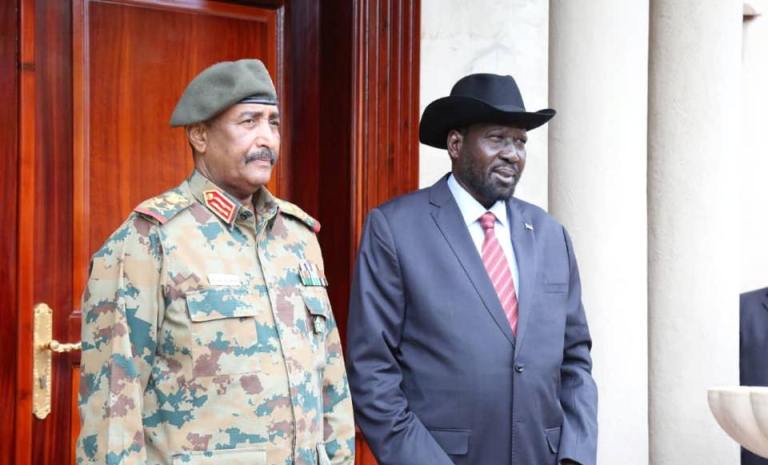S. Sudan’s Kiir, Burhan discuss bilateral relations
March 28, 2021 (JUBA) – South Sudan President, Salva Kiir on Sunday discussed bilateral relations with the Chairman of Sudan’s Transitional Council, Abdel Fattah al-Burhan.
The sideline meeting took place in the South Sudanese capital, Juba.
“H.E President Salva Kiir Mayardit and his guest discussed ways of strengthening the bilateral ties between the two countries, as well as the progress of the implementation of the peace agreement of South Sudan and Sudan,” the office of the president said in a statement.
Al-Buhran was in the South Sudanese capital for Sudan’s peace talks with the hold-out opposition group led by General Abdel Aziz Adam al-Hilu of the Sudan People’s Liberation-North (SPLM-N) and the Sudan Liberation Movement (SLM) headed by Abdel Wahid al-Nur.
On Friday, President Kiir held a meeting with al-Nur and al-Hilu in a bid to convince the SLM leader to join the Declaration of Principle (DoP).
Speaking to the media after last week’s meeting, al-Nur said they briefed the South Sudanese leader on their initiatives and road map to gather the Sudanese together in order to put all problems of their country into one package and seek the solutions.
On Sunday, Sudan’s interim government and al-Hilu’s SPLM-N rebels in the country agreed to restart peace talks, following the signing of the Declaration of Principles.
The document was signed in Juba after several months of a stalemate.
According to the text of the DoP, al-Burhan and al-Hilu agreed to consolidate the sovereignty, independence and territorial integrity of Sudan. Also, they admit the ethnic, religious and cultural diversity of its population.
They further agreed to establish a “civil, democratic, federal state in Sudan, wherein, the freedom of religion, the freedom of belief and religious practices and worship shall be guaranteed to all Sudanese people by separating the identities of culture region, ethnicity and religion from the state”.
“No religion shall be imposed on anyone and the State shall not adopt any official religion. The State shall be impartial in terms of religious matters and matters of faith and conscience,” further emphasized texts of the DoP.
(ST)

